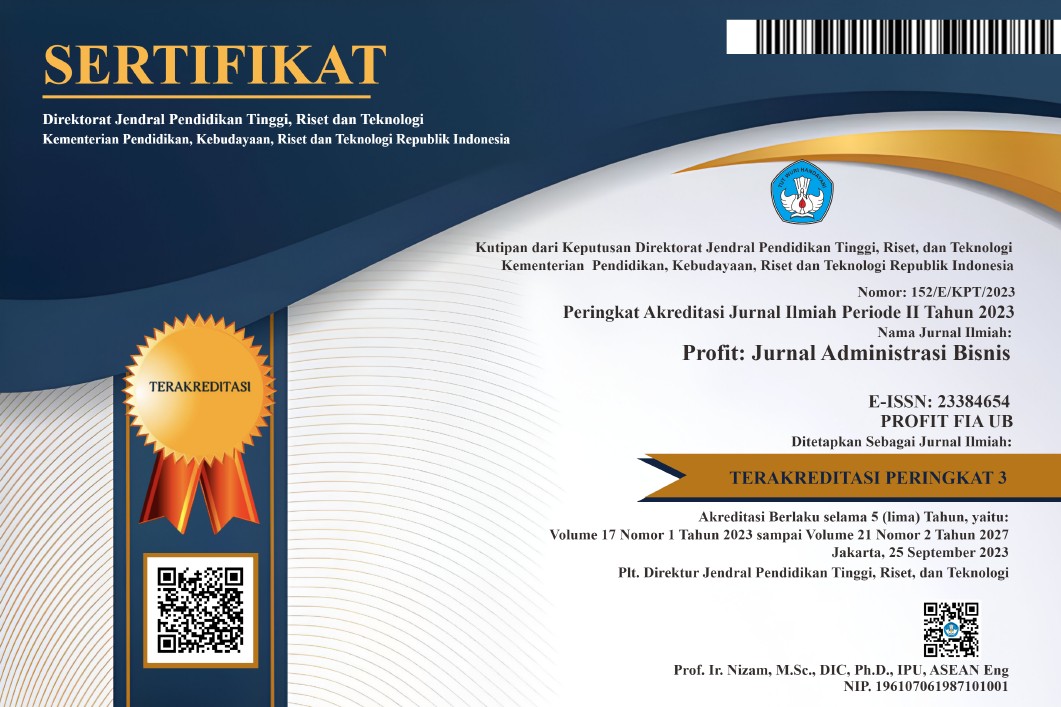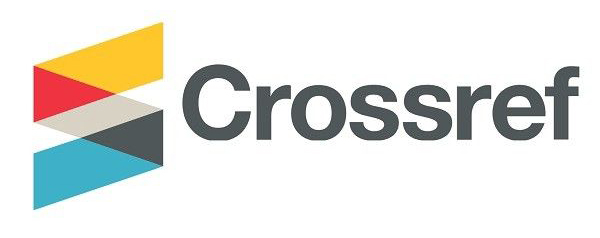PENGARUH FINANCIAL KNOWLEDGE DAN FINANCIAL ATTITUDE TERHADAP FINANCIAL BEHAVIOR PADA YOUTH ENTREPRENEUR KOTA MALANG
Keywords:
Financial Knowledge, Attitude, Financial BehaviorAbstract
The ability to manage finances is able to have an affect the financial condition of individuals and business organizations in the future. The study aims to determine the impact of financial knowledge on financial behavior and the role of financial attitude on financial behavior and also its role as a mediator between the relationship of financial knowledge and financial behavior. This study was conducted by collecting and analyzing journals related to the research objectives. Based on the literature study conducted, financial knowledge has an effect on financial attitude and financial behavior. Financial attitude has a positive impact on financial behavior and positively moderates the relationship between financial knowledge and financial behavior.
References
Ajzen, I. (2011). The theory of planned behaviour: Reactions and reflections. Psychology and Health, 26(9), 1113–1127. https://doi.org/10.1080/08870446.2011.613995
Amanah, E., Iradianty, A., & Rahardian, D. (2016). Pengaruh Financial Knowledge , Financial Attitude Dan External Locus of Control Terhadap Personal Financial Management Behavior Pada Mahasiswa S1 Universitas Telkom the Influence of Financial Knowledge , Financial Attitude and External Locus of Control on. e-Proceeding of Management, 3(2), 1228–1235.
Ameliawati, M., & Setiyani, R. (2018). The Influence of Financial Attitude, Financial Socialization, and Financial Experience to Financial Management Behavior with Financial Literacy as the Mediation Variable. KnE Social Sciences, 3(10), 811. https://doi.org/10.18502/kss.v3i10.3174
Arifin, A. Z., Kevin, & Siswanto, H. P. (2017). the Influence of Financial Knowledge, Financial Confidence, and Income on Financial Behavior Among Employees in Jakarta. Jurnal Ilmiah: MIX, VII(01), 37–47. Diambil dari http://publikasi.mercubuana.ac.id/index.php/Jurnal_Mix/article/view/1476
Buess, M. (2012). Metastasiertes nierenzellkarzinom: Heutige therapeutische optionen. Tagliche Praxis, 53(1), 51–58.
Dew, J., & Xiao, J. J. (2011). The financial management behavior scale: Development and validation. Journal of Financial Counseling and Planning, 22(1), 43–59.
Dwiastanti, A. (2015). Financial Literacy as the Foundation for Individual Financial Behavior. Journal of Education and Practice, 6(33), 99–105. Diambil dari http://www.eric.ed.gov/contentdelivery/servlet/ERICServlet?accno=EJ1083664
Falahati, L., Sabri, M. F., & Paim, L. H. J. (2012). Assessment a model of financial satisfaction predictors: Examining the mediate effect of financial behaviour and financial strain. World Applied Sciences Journal, 20(2), 190–197. https://doi.org/10.5829/idosi.wasj.2012.20.02.1832
Fünfgeld, B., & Wang, M. (2009). Attitudes and behaviour in everyday finance: Evidence from Switzerland. International Journal of Bank Marketing, 27(2), 108–128. https://doi.org/10.1108/02652320910935607
Garg, N., & Singh, S. (2018). Financial literacy among youth. International Journal of Social Economics, 45(1), 173–186. https://doi.org/10.1108/IJSE-11-2016-0303
Gerrans, P., Speelman, C., & Campitelli, G. (2014). The Relationship Between Personal Financial Wellness and Financial Wellbeing: A Structural Equation Modelling Approach. Journal of Family and Economic Issues, 35(2), 145–160. https://doi.org/10.1007/s10834-013-9358-z
Halim, Y. K. E., & Astuti, D. (2015). Financial Stressors, Financial Behavior, Risk Tolerance, Financial Solvency, Financial Knowledge, dan Kepuasan Finansial. Jurnal Finesta, 3(1), 19–23. https://doi.org/10.1109/EDOC.2009.26
Herdjiono, I., Damanik, L. A., & Musamus, U. (2016). Pengaruh financial attitude, financial attitude, parental income terhadap financial management behavior. Manajemen Teori dan Terapan, 1(3), 226–241.
Kholilah, N. Al, & Iramani, R. (2013). Studi Financial Management Behavior Pada Masyarakat Surabaya. Journal of Business and Banking, 3(1), 69. https://doi.org/10.14414/jbb.v3i1.255
Laili Rizkiawati, N., & AsandimitraHaryono, N. (2018). Pengaruh Demografi, Financial Knowledge, Financial Attitude, Locus of Control Dan Financial Self-Efficacy Terhadap Financial Management Behavior Masyarakat Surabaya. Jurnal Ilmu Manajemen (JIM), 6(3).
Lianto, R., & Elizabeth, S. M. (2017). Rizky Lianto, Sri Megawati Elizabeth. 1–12.
Lim, T. S., Mail, R., Abd Karim, M. R., Ahmad Baharul Ulum, Z. K., Jaidi, J., & Noordin, R. (2018). A serial mediation model of financial knowledge on the intention to invest: The central role of risk perception and attitude. Journal of Behavioral and Experimental Finance, 20, 74–79. https://doi.org/10.1016/j.jbef.2018.08.001
Listiani, K. (2017). Pengaruh Financial Knowledge, Locus of Control dan Financial Attitude Terhadap Financial Management Behavior Pada Mahasiswa. Artikel Stie Perbanas Surabaya.
Lusardi, A., & Mitchell, O. S. (2008). NBER WORKING PAPER SERIES PLANNING AND FINANCIAL LITERACY: HOW DO WOMEN FARE? Planning and Financial Literacy: How Do Women Fare? 413–417. Diambil dari http://www.nber.org/papers/w13750
Nicolini, G. (2019). Financial literacy and financial behavior. Financial Literacy in Europe, (July), 85–140. https://doi.org/10.4324/9780429431968-3
Nkundabanyanga, S. K., Kasozi, D., Nalukenge, I., & Tauringana, V. (2014). Lending terms, financial literacy and formal credit accessibility. International Journal of Social Economics, 41(5), 342–361. https://doi.org/10.1108/IJSE-03-2013-0075
OECD. (2016). Adult Financial Literacy Competencies CORE COMPETENCIES FRAMEWORK ON.
Ramalho, T. B., & Forte, D. (2019). Financial literacy in Brazil – do knowledge and self-confidence relate with behavior? RAUSP Management Journal, 54(1), 77–95. https://doi.org/10.1108/RAUSP-04-2018-0008
Santini, F. D. O., Ladeira, W. J., Mette, F. M. B., & Ponchio, M. C. (2019). The antecedents and consequences of financial literacy: a meta-analysis. International Journal of Bank Marketing. https://doi.org/10.1108/IJBM-10-2018-0281
Saurabh, K., & Nandan, T. (2018). Role of financial risk attitude and financial behavior as mediators in financial satisfaction: Empirical evidence from India. South Asian Journal of Business Studies, 7(2), 207–224. https://doi.org/10.1108/SAJBS-07-2017-0088
Sentosa, I. (2012). Examining a Theory of Planned Behavior ( Tpb ) and Technology Acceptance Model ( Tam ) in Internetpurchasing Using Structural Equation Modeling. 2(2), 62–77.
Woodyard, A., & Robb, C. (2012). Financial Knowledge and the Gender Gap. Journal of Financial Therapy, 3(1). https://doi.org/10.4148/jft.v3i1.1453
Yuan, H., & Yang, S. (2014). The Survey of Financial Literacy in Shanghai. Internation Journal of Managerial Studies and Research, 2(10), 46–54.
Downloads
Published
Issue
Section
License
The copyright of the received article shall be assigned to the journal as the publisher of the journal. The intended copyright includes the right to publish the article in various forms (including reprints). The journal maintains the publishing rights to the published articles.

This work is licensed under a
Creative Commons Attribution-NonCommercial 4.0 International License
















